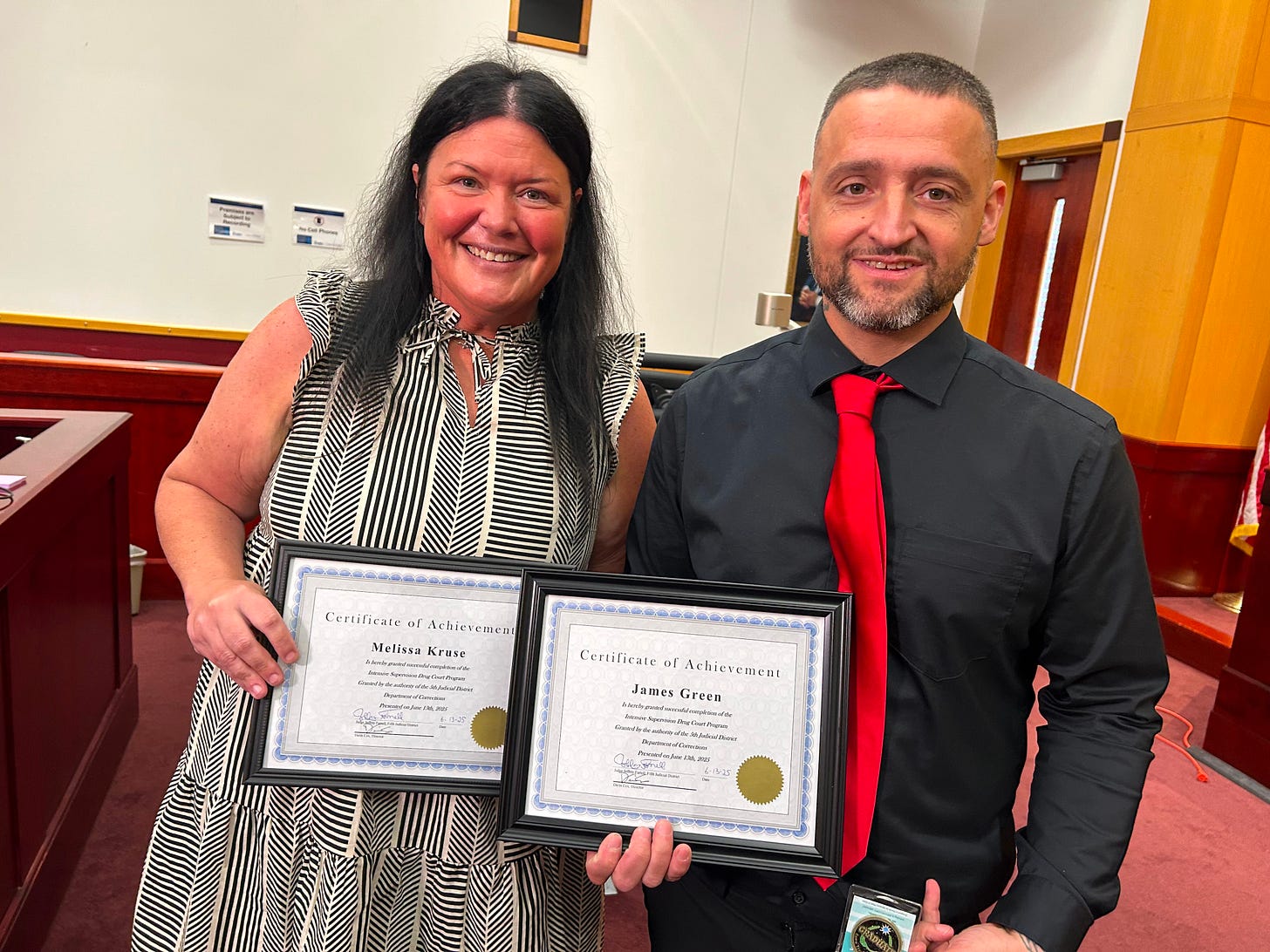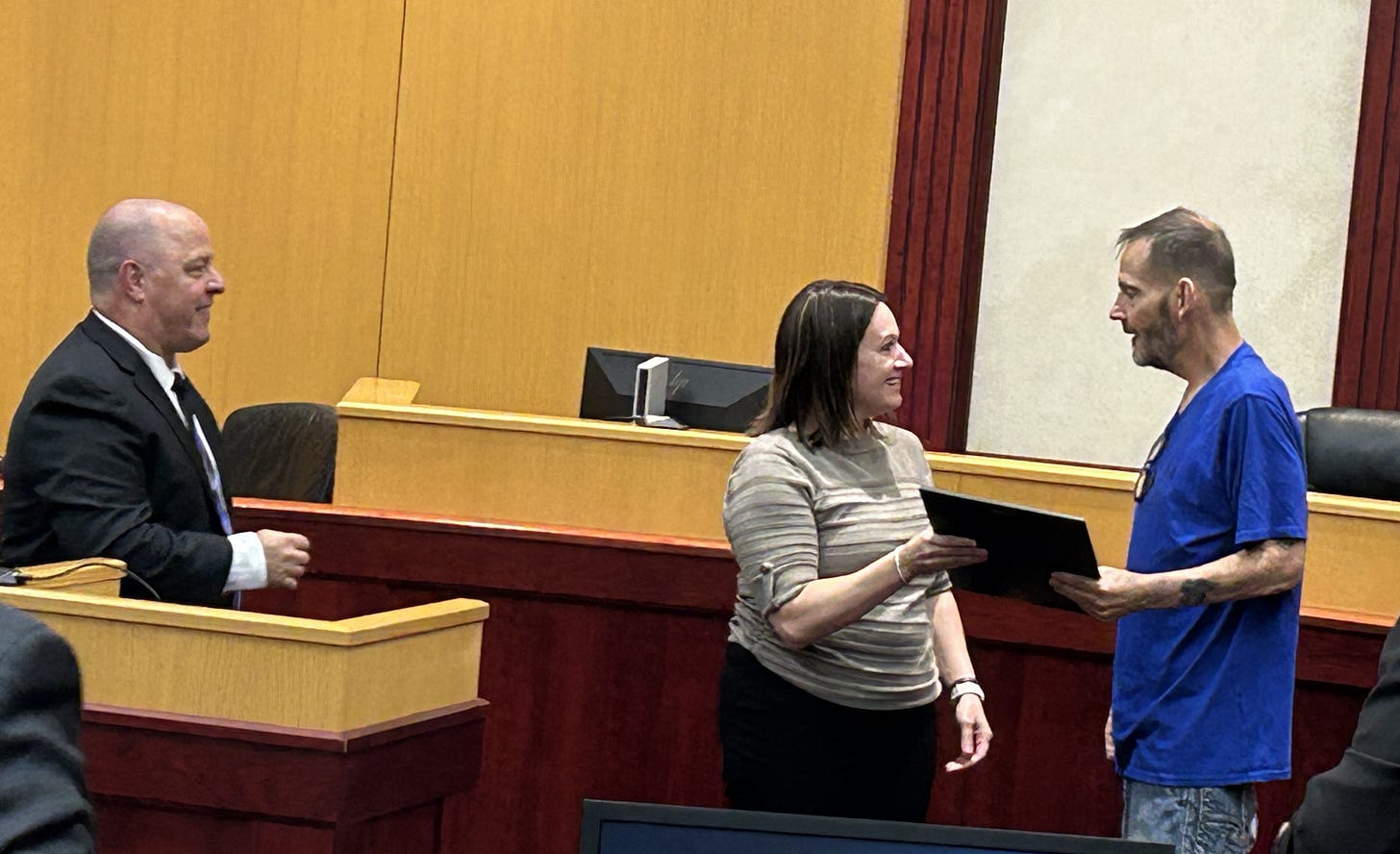These impressive graduates show how Iowa can save money and save lives
Expanding drug courts can reduce crime, prison costs
The event featured many of the trappings of a law school commencement: The graduates’ families came to campus carrying flowers, a state Supreme Court justice sat amid the dignitaries, and speeches overflowed with words of praise and promise.
“You have faced challenges that most cannot imagine,” Drake Law School Dean Roscoe Jones told the graduates on June 13. “You have not only changed your lives, you have also changed the lives of your families and communities.”
The pomp and circumstance matched the occasion’s significance. Only nine people – six men, three women - completed the rigorous program with strict requirements. Some finished in two years, and one took four. Another had graduated four years ago, relapsed, and repeated.
Polk County’s Intensive Supervision Drug Court is indeed a long, difficult journey, filled with 12-step meetings, curfews, community service, court hearings, and “dropping UAs.” Many of the graduates said they didn’t believe they would make it.
“A year ago, I was ready to give up. Staff wouldn’t give up on me,” said one graduate, Rodney Davis. “I now have a life that has meaning,” including a supportive employer, a commercial driver’s license, and a future.

Drug court graduation is one of the most inspiring things I’ve witnessed in a courtroom. It also leaves me wanting more: more graduates, more success stories, more treatment programs across the state. Iowa could do much more to expand this alternative to prison.
Drug courts are reserved for defendants whose addictions lead to crime. They are at high risk of repeatedly stealing or committing other offenses to feed their habits.
Polk County created the state’s first adult criminal drug court in 1996, just seven years after the nation’s first drug court was established in Miami.
I attended my first drug court graduation in 1999. One of the graduates was a bear of a man who showed me a photo of his emaciated face when he was regularly using meth. He gushed about how the court had changed his life. It was the first time I’d ever seen a defendant hug a judge.
Such happy outcomes have been documented in multiple studies in Iowa and nationally. While results vary depending on many factors, graduates have lower rates of recidivism and substance use, and the treatment is far more cost-effective than incarceration, studies show.
An Iowa Department of Corrections study showed that every $1 spent on drug court returns a $9.61 benefit over a 10-year time frame.
Despite the results, funding has been inconsistent and depends on a mix of local support, state appropriations, and federal grants. “In general, Drug Courts have been left to their own means to fund and provide training to Drug Court Judges and staff, identify treatment providers, and otherwise enhance their programs,” according to a 2018 study of Iowa specialty courts by the National Center for State Courts.
Now that the Iowa Legislature has finally come up with a structure to spend opioid settlement money, expanding drug courts and other treatment programs should be on list of uses.

In Polk County, drug court graduations are held two or three times a year. Nine people is considered a large class; the graduation on June 13 occurred in the courtroom of the Drake Legal Clinic to accommodate the crowd.
Currently, 24 people are in the county’s drug court program, charged with crimes including theft, fraud, forgery, and burglary. Many more defendants qualify, if the program had more staff.
Drug court isn’t cheap, as it requires a judge, prosecutor, defense attorney, probation officer, coordinator, and support staff. But it’s generally a third of the cost, per participant, of prison.
The morning before the noon graduation on June 13, District Judge Jeffrey Ferrell presided over the regular routine of drug court. Defendants reported on their progress and gave updates on their work, community service, and treatment plans.
The reports went deeper than that, however, as the participants shared about larger issues they were confronting: past traumas, personality conflicts, relationship issues, and other root causes of their addictions.
The staff challenged the participants with some of the mantras of drug court:
“Own your mistakes.”
“All the truth, all the time.”
“Your worst day sober is better than your best day high.”
Later, participants listened to the graduates reinforce those lessons. The grads shared how they “learned to love myself” and “untangle the mess inside me.” They thanked their family, court officials, sponsors, therapists, and each other.
Graduate Jeremiah Bender summed up the goal: “Recovery isn’t just about staying clean, it’s about building a life worth living.”
“True Justice” is part of the Iowa Writers’ Collaborative. Check out the lineup of writers and consider subscribing.





Thanks for shining a light on this program!
Thanks so much for writing about Drug Court! I was one of the early Drug Court Judges in Polk County, and I am so happy that the program continues to save lives and keep people out of prison. The stories! The struggles! The victories! Drug Court Graduations are the best. I really enjoyed your column.